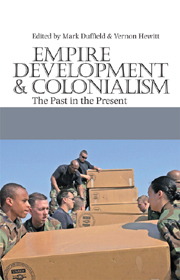Book contents
- Frontmatter
- Contents
- Acknowledgements
- Notes on Contributors
- Introduction
- 1 The Exceptional inclusion of ‘Savages’ & ‘Barbarians’
- 2 Empire, International Development & the Concept of Good Government
- 3 Empire: a Question of Hearts?
- 4 ‘Conflict-Sensitive’ Aid & Making liberal Peace
- 5 Development, Poverty & Famines
- 6 Plain Tales from the Reconstruction Site
- 7 The International Politics of Social Transformation
- 8 Liberal Interventionism & the Fragile State
- 9 Freedom, Fear & NGOs
- 10 Theorising Continuities between Empire & Development
- 11 Spatial Practices & Imaginaries
- 12 Decolonising the Borders in Sudan
- 13 ‘Individualism is, Indeed, Running Riot’
- Index
8 - Liberal Interventionism & the Fragile State
Linked by Design?
Published online by Cambridge University Press: 05 February 2013
- Frontmatter
- Contents
- Acknowledgements
- Notes on Contributors
- Introduction
- 1 The Exceptional inclusion of ‘Savages’ & ‘Barbarians’
- 2 Empire, International Development & the Concept of Good Government
- 3 Empire: a Question of Hearts?
- 4 ‘Conflict-Sensitive’ Aid & Making liberal Peace
- 5 Development, Poverty & Famines
- 6 Plain Tales from the Reconstruction Site
- 7 The International Politics of Social Transformation
- 8 Liberal Interventionism & the Fragile State
- 9 Freedom, Fear & NGOs
- 10 Theorising Continuities between Empire & Development
- 11 Spatial Practices & Imaginaries
- 12 Decolonising the Borders in Sudan
- 13 ‘Individualism is, Indeed, Running Riot’
- Index
Summary
Introduction
Following the international interventions in Afghanistan and Iraq, a number of aid-related ideas concerned with working in difficult environments, or engaging with countries described as poor performers, or indeed the problems of fragile states have entered policy discourse (Torres and Anderson 2004; DCD 2004; DFID 2005). They attempt to describe the developmental challenge at a time when, despite the recent step-change in all forms of humanitarian, development and peace interventionism, it is still unclear whether any of these incursions have actually solved the larger political problems that gave rise to them (Smith 2006). Since ideas concerning difficult environments or poor performers are similar in content, the term ‘fragile state’ is used here as a generic descriptor to denote this discourse. Policy thinking on fragile states presents itself as innovative and forward-looking regarding the problem of state reconstruction in circumstances where local administrative capacity and political will are absent or limited (DFID 2005). This chapter's central argument, however, is that, rather than being wholly new, fragile state discourse reproduces some of the key assumptions and relations of colonial bureaucracy, in particular, the liberal practice of indirect rule or native administration (Lugard [1922]).
Although Native Administration was concerned with the tribe, and the object of fragile state discourse is the state, both these entities are understood and acted upon in a similar way. In other words, as taxonomies or hierarchies of different capacities and political will that either support or prevent their fulfilling a liberal ideal of autonomy and independence.
- Type
- Chapter
- Information
- Empire, Development and ColonialismThe Past in the Present, pp. 116 - 129Publisher: Boydell & BrewerPrint publication year: 2009



